John Fitzgerald Kennedy was one of America's most charismatic and popular presidents. His heroism during World War II has been well documented. His leadership and no-blink courage during the Cuban Missile Crisis — with World War III in the balance — ensures his place among world leaders of the ages. Kennedy's peccadillos outside the Oval Office were met by the American public with a collective blush.
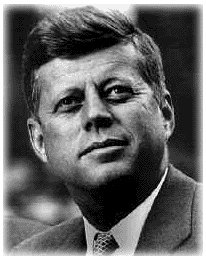 The tragic end to the JFK era in Dallas on November 22, 1963, ripped the heart out of American innocence and stunned the world into recognizing the cataclysmic social and political changes that were occurring in every corner of the globe.
The tragic end to the JFK era in Dallas on November 22, 1963, ripped the heart out of American innocence and stunned the world into recognizing the cataclysmic social and political changes that were occurring in every corner of the globe.
Fare thee well, Camelot.
The early years
Born in May 1917, John was the second child of Joseph and Rose. Known in his Irish-Catholic neighborhood as "Jack," he was a sickly child, having suffered from whooping cough, scarlet fever, and other maladies. After taking a turn for the better, his family could easily joke that if a mosquito were to bite him, it would be the insect's life in danger.
Jack was part of a large household with elder brother Joseph Jr., younger sisters Rosemary, Kathleen, Eunice, and Patricia, younger brother Robert, sister Jean, and youngest brother Edward, better known as Teddy.
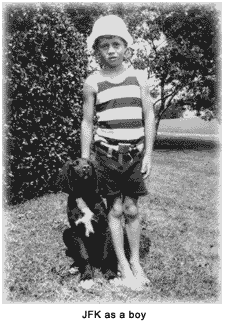 Despite his long list of illnesses, Jack was full of life and was well liked. His father had endowed him with a competitive spirit, and Jack enjoyed a number of sports. His main competition was his brother and best friend, Joe Jr.
Despite his long list of illnesses, Jack was full of life and was well liked. His father had endowed him with a competitive spirit, and Jack enjoyed a number of sports. His main competition was his brother and best friend, Joe Jr.
Kennedy tapped a promising future by attending an exclusive prep school, Choate Rosemary Hall, in Wallingford, Connecticut, and was a member of "The Muckers," a select group of practical jokers. Jack's final prank was to "fix" an election, naming himself "Most Likely to Succeed."
Jack succeeded indeed, by graduating from Harvard just as World War II broke out. His thesis was good enough to be published in book form with the title Why England Slept, iterating England's unpreparedness for war with Germany.
PT-109
Following graduation, Jack joined the Navy. With his credentials and aid from his father, now the U.S. Ambassador to England, he was made an ensign and assigned to naval intelligence in Washington, D.C. He was there when the attack on Pearl Harbor occurred.
Soon after, Kennedy volunteered for PT boat duty and took his training in Rhode Island. A bad back kept him from combat service and he was known to complain that he was "getting the shaft." That bit of grumbling earned him the moniker "Shafty." Nevertheless, Kennedy was named the commander of an 80-foot patrol torpedo boat, the PT-109, whose theater of operations was the Solomon Islands.
While on night patrol in August 1943, a Japanese destroyer came out of nowhere and sliced Kennedy's boat in half. Out of a crew of 12, two died instantly. Others had leaped overboard moments before impact and made their way to a piece of flotsam. The collision injured Kennedy's back, but he managed to rescue a burned crewman. He hauled him to the wreckage where the other crewmen were clinging for life. As dawn broke, they made their way to a small island a few miles distant. Subsisting on coconuts and rainwater, the men were discovered by friendly natives and eventually rescued by the Navy.
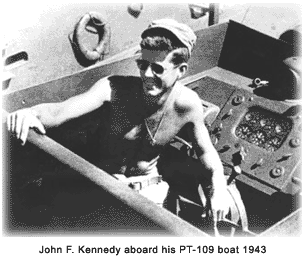 The event made headlines in the New York Times and was later made into a movie. Altogether, Kennedy spent nine months in the South Pacific. When he returned stateside, he underwent back surgery.
The event made headlines in the New York Times and was later made into a movie. Altogether, Kennedy spent nine months in the South Pacific. When he returned stateside, he underwent back surgery.
In June 1944, Kennedy received the Gallantry in Action medal after earlier being honored with the Purple Heart. In August of that year, brother Joseph was killed when his plane exploded shortly after takeoff while carrying more than 21,000 pounds of explosives meant for a German V-1 rocket launching pad in Normandy, France.
Jack the politician
Backed by his father and "Honey Fitz" Fitzgerald, his maternal grandfather and ex-mayor of Boston, Kennedy campaigned hard for a seat in the U.S. Congress. With his war heroics serving as a plus, he handily defeated his opponents.
Kennedy held that seat until 1952, when he ran for the U.S. Senate against the popular Republican incumbent, Henry Cabot Lodge Jr., who was from a family that could trace its roots to the Mayflower. In a close election, Kennedy pulled off an upset.
In 1953, he managed another upset by wooing and eventually marrying the beautiful Jacqueline Lee Bouvier.
In 1955, Kennedy underwent more back surgery. During his lengthy hospital stay and rehabilitation, he wrote Profiles in Courage, a book that analyzed the lives of eight notable U.S. Senators. The book earned Kennedy the Pulitzer Prize for biography.
The first bump in the road of Kennedy's political career arrived as he lay in the hospital. The Senate censured Senator Joseph McCarthy for instigating a nationwide panic over Communists in the U.S. government. Kennedy didn't cast a vote, so he was criticized for not jumping on the anti-McCarthy bandwagon. Kennedy was in a bind: McCarthy had been a guest at the Kennedy retreat in Hyannisport and brother Bobby Kennedy had served on McCarthy's staff.
Kennedy's persona drew more attention when he began to serve on the Senate Select Committee to Investigate Improper Activities in Labor-Management Relations. The committee investigated racketeering among labor union chiefs. The result was a bill that Kennedy sponsored, to rid the unions of criminal activities.
Moving up
Kennedy now enjoyed the national spotlight. He had narrowly lost the nomination for the vice-presidential spot on the Adlai E. Stevenson ticket for 1956, but was re-elected to the Senate with more than 73 percent of the vote. When told by an old pol that he should easily capture the vice-presidential nomination in 1960, Kenndy replied, "I'm not running for the vice-presidency anymore. I'm running for the presidency."
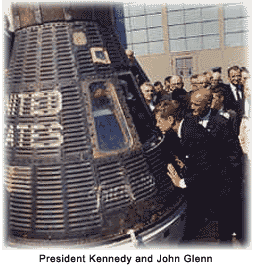 After securing the Democratic nomination in a close race with Lyndon B. Johnson from Texas, Kennedy named Johnson as his running mate.
After securing the Democratic nomination in a close race with Lyndon B. Johnson from Texas, Kennedy named Johnson as his running mate.
A crucial factor in the election was the first televised presidential debate. The Republican nominee, Richard M. Nixon, refused makeup and was feeling ill, owing to a knee injury on the way to the studio. He expected to win voters with his foreign-policy expertise, but viewers beheld a pale, profusely sweating man with a five-o'clock shadow, wearing a gray suit that blended into the scenery while his rival looked tanned and well.Later research indicated that those who had listened to the debate on radio thought Nixon had won, but the television audience gave the win to Kennedy.
The campaign assumed two main themes: The economic issue was the Soviet Union's high economic growth rate compared to that of the United States. According to analysis at the time, the Soviet economy was expected to overtake the American economy by 1984.
Kennedy also claimed that the Republican administration had allowed a "missile gap" to open by not matching Soviet defense spending and allowing the U.S. military to weaken. The claim was made more credible by Soviet superiority in the space program, as evidenced by their successful Sputnik orbit, contrasted by numerous U.S. launch failures. In retrospect, there never was a missile gap.
The election results were so close that Nixon was urged to call for a recount in such key states as Illinois, Missouri, and New Jersey. He publicly refused, but privately wanted 11 states included in the recount. Legal battles stretched into the summer of 1961, long after Kennedy had been inaugurated.
President Kennedy
"And so, my fellow Americans: ask not what your country can do for you — ask what you can do for your country. My fellow citizens of the world: Ask not what America will do for you, but what together we can do for the freedom of man."At the age of 43, Kennedy became the second-youngest president* (minimum age is 35) and first Roman Catholic ever, winning by the slimmest of margins — 115,000 votes.
-John F. Kennedy, from his Inaugural Address
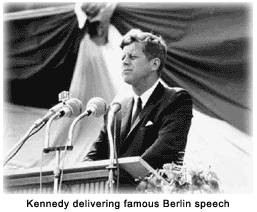 As Kennedy entered the glare of the Oval Office, he did so amidst tensions in Southeast Asia and nearby Cuba, as well as the continuing space and arms race with the Soviets.
As Kennedy entered the glare of the Oval Office, he did so amidst tensions in Southeast Asia and nearby Cuba, as well as the continuing space and arms race with the Soviets.
He suffered a rude awakening in April 1961 when the Bay of Pigs Invasion to overthrow Cuban dictator Fidel Castro turned sour. The invasion facilitated Castro's call for more aid from the Soviet Union.
In June, Kennedy met with Nikita Khrushchev in Vienna for two days of meetings. The Soviet leader carried away an impression that the U.S. president lacked resolve. The fearsome Cuban Missile Crisis of October 1962 proved Khrushchev's impression wrong, when he acceded to Kennedy's demand that Soviet nuclear missiles recently installed in Cuba be taken out.
In February 1962, John Glenn became the first American to orbit the earth. That prompted Kennedy to pledge that the U.S. would put a man on the moon "before the end of this decade."** On the foreign relations front, Kennedy created the Peace Corps. The program, which still exists, encourages Americans to give of their talents in Third-World countries. Volunteers are trained for the opportunity to educate youth and elders, facilitate community improvement projects and care for the environment.
Kennedy then made good on his promise to get tough on Organized Crime by signing three bills into law that targeted the prohibition of telephone betting, interstate transportation for the purposes of racketeering,* and commercial transportation of betting equipment.
Following the missile crisis, Kennedy moved on to make civil rights a priority of his administration. In June 1963, he ordered Alabama governor George Wallace to open the doors to the University of Alabama to students regardless of the color of their skin.
Also in 1963, Kennedy visited the Berlin Wall, where he delivered his electrifying speech containing the following: "All free men, wherever they may live, are citizens of Berlin, and therefore, as a free man, I take pride in the words 'Ich bin ein Berliner.'"
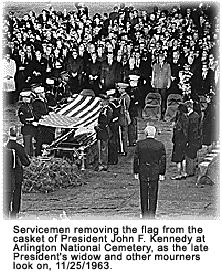 That fateful day
That fateful day
On November 22, 1963, the president and first lady arrived in Dallas, to board an open-top limousine with Governor John B. Connelly for a 45-minute ride to speak to a meeting of the Citizens Council. As the vehicle approached a triple overpass, shots were heard, and the president slumped forward with a mortal head wound.
Fifteen doctors attempted to save Kennedy's life, but to no avail.
After solemn ceremonies, Kennedy's body was taken to Arlington National Cemetery. A promising statesman, father, and son was laid to rest.